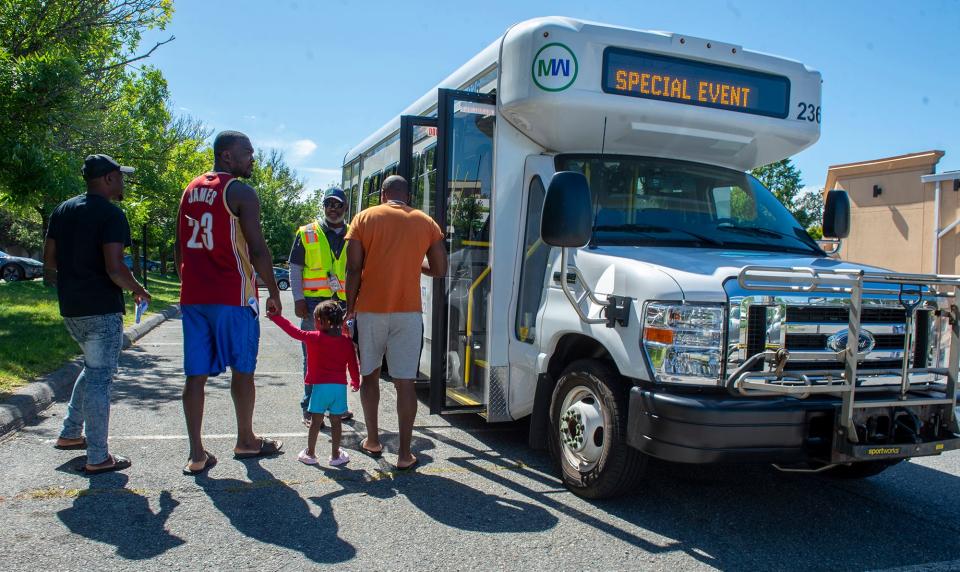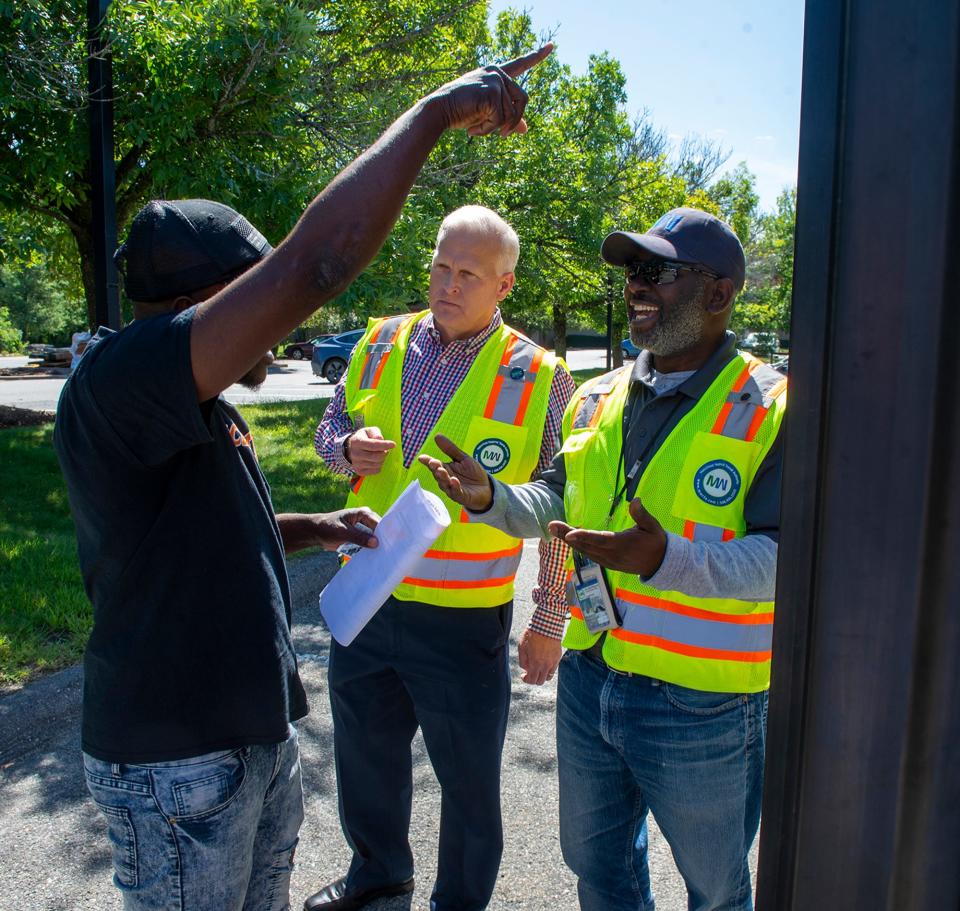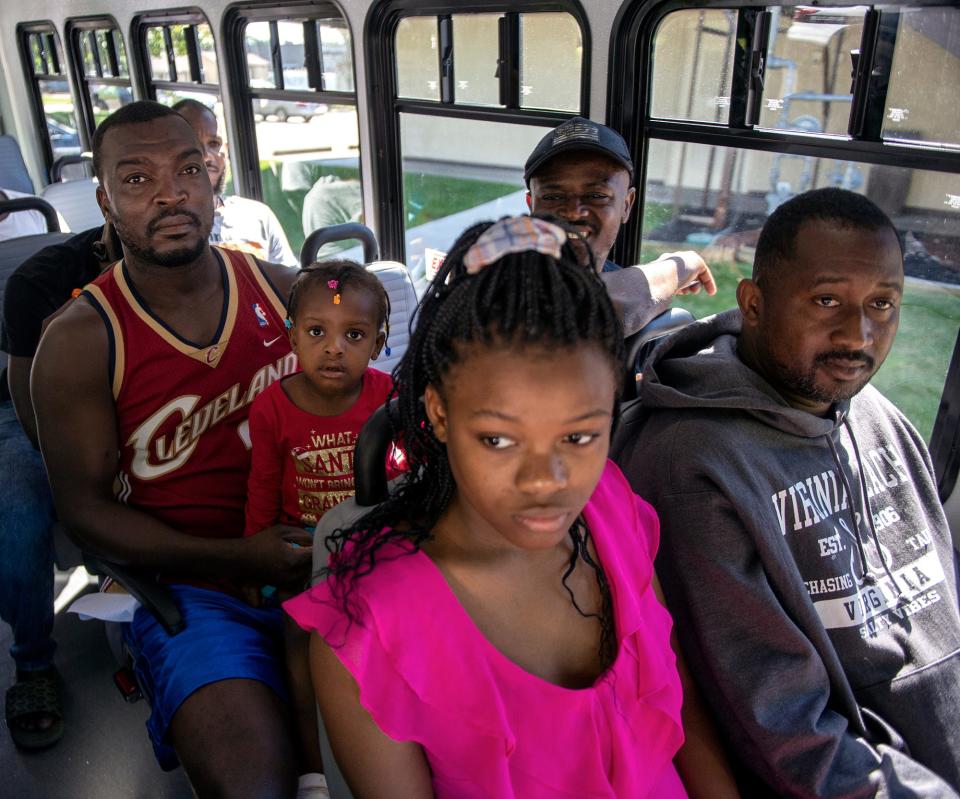Migrants start to integrate with Framingham community by learning how to get around
FRAMINGHAM — Asylum-seeking migrants who were recently placed in Framingham are ready to ride.
On Thursday, the MetroWest Regional Transit Authority (MWRTA) visited the Red Roof Inn on Cochituate Road to teach a group of about 30 asylum seekers on how to use the region's bus system. Instruction was led by Jon Fetherston, director of community relations for the MWRTA, with Giovanni Fleurancois, a Haitian native who is general manager of the MWRTA's transportation company, National Express, translating in Creole.
Fetherston called the MWRTA bus system "a lifeline."
"It can take them anywhere in the MetroWest area," he said.

'Give us a provider': More than 130 homeless migrants are housed in Framingham
Asylum seekers received pre-paid Catch Cards, cards on which funds can be loaded to be used to pay fares to transport riders along the MWRTA's Fixed Route system. Each recipients got three months of pre-paid service.
"It's a lifeline to the grocery stores, to education and to future employment opportunities," Fetherston continued. "Assuming most of these people don't have driver's licenses, it's going to be a lifeline and will create opportunities for them."
"The Catch Cards provide free service on the fixed routes, but they will have to pay for the Catch Connect service," Fetherston said in reference to an MWRTA program that allows riders to request specific pick-up and drop-off locations using an app. "They can reload the card at the hub."
Asylum seekers get a ride-along to learn about the MWRTA
Fetherston and Fleurancois took 14 asylum seekers, along with Daily News staff on a ride-along as part of teaching the new asylum seekers how to use the MWRTA. The two MWRTA employees explained how to use the Catch Cards, and how to request stops, flag down a bus and navigate the MWRTA Fixed Route system.
As part of the ride-along, the group was taken to the Natick Mall, where Fetherston and Fleurancois explained that this stop can be used to access many MWRTA routes.

'Curb-to-curb service': New MWRTA program launches in Hudson, Marlborough
Fleurancois and Fetherston said they would develop a "code word" for asylum seekers to use when contacting the MWRTA, so that they can receive help from someone who speaks Haitian Creole.
The MWRTA operates more than 15 fixed bus routes throughout MetroWest. The transit organization also runs commuter shuttles for first- and last-mile travel between MBTA rail service and employment destinations throughout the region. Three door-to-door services are also available.
The MWRTA serves 16 communities, including Ashland, Dover, Framingham, Holliston, Hopedale, Hopkinton, Hudson, Marlborough, Milford, Natick, Sherborn, Southborough, Sudbury, Wayland, Wellesley and Weston.
Migrants began arriving in Framingham on July 28
Migrant families arrived in Framingham in a couple of different waves after passing through one of the state's immigration welcome centers. State officials ensure migrants meet requirements set by Massachusetts to be granted emergency housing, then those deemed eligible are moved into temporary shelter. But with so many migrants entering the state, it ran out of temporary housing and families were then moved into hotel rooms.
With little notice from the state, migrant families began arriving in Framingham on July 28. The first wave, which included 39 people — mostly ethnic Haitians who were seeking asylum in America as a result of instability in their home country — were initially moved into the Red Roof Inn.

'Looking for work': Why employment for asylum-seeking refugees is a long road
Migrants were dropped off at the hotel — which sits right off the Mass Pike — by the state, with the city having to scramble to arrange for services and donations to get them situated. The state did assign a care coordinator for this first wave of migrants, Framingham nonprofit Jewish Family Services of Metrowest, to handle such tasks as getting families enrolled in Supplemental Nutritional Assistance Program (SNAP) benefits, teaching them how to access public transportation, assisting with employment certification and other services.
The state also provided some recent medical assistance, as nurses arrived in Framingham to evaluate the health of some migrants.
The Red Roof Inn is the only Framingham hotel that has been publicly identified as one that is housing migrants.
This article originally appeared on MetroWest Daily News: Migrants staying in Framingham learn MWRTA's bus system basics

